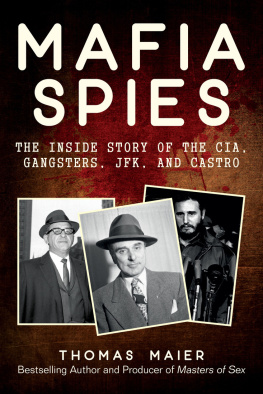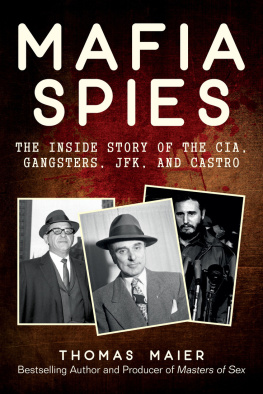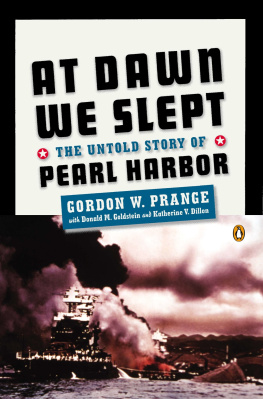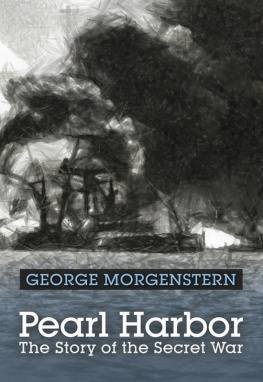Thank you for downloading this Touchstone eBook.
Join our mailing list and get updates on new releases, deals, bonus content and other great books from Touchstone and Simon & Schuster.
C LICK H ERE T O S IGN U P
or visit us online to sign up at
eBookNews.SimonandSchuster.com
We hope you enjoyed reading this Touchstone eBook.
Join our mailing list and get updates on new releases, deals, bonus content and other great books from Touchstone and Simon & Schuster.
C LICK H ERE T O S IGN U P
or visit us online to sign up at
eBookNews.SimonandSchuster.com

TOUCHSTONE
Rockefeller Center
1230 Avenue of the Americas
New York, NY 10020
www.SimonandSchuster.com
Copyright 1994 by Osprey Productions, Inc.
Epilogue and afterword copyright 2002 by Mark Riebling
All rights reserved, including the right of reproduction in whole or in part in any form.
First Touchstone Edition 2002
T OUCHSTONE and colophon are registered trademarks of Simon & Schuster, Inc.
For information regarding special discounts for bulk purchases, please contact Simon & Schuster Special Sales at 1-800-456-6798 or
The Library of Congress has catalogued the Alfred A. Knopf edition as follows:
Riebling, Mark.
Wedge: the secret war between the FBI and CIA /by Mark Riebling.
p. cm.
Includes index.
1. Intelligence serviceUnited States. 2. United States. Central Intelligence Agency. 3. United States. Federal Bureau of Investigation. I. Title.
JK468.16R561994
327.120973dc2093-4373CIP
ISBN 0-7432-4599-7
ISBN 978-1-4516-0385-9 (eBook)
Grateful acknowledgment is made to the following for permission to reprint previously published material:
ATHENEUM PUBLISHERS: Excerpts from The Night Watch by David Atlee Phillips, copyright 1977 by David Atlee Phillips. Reprinted by permission of Atheneum Publishers.
CURTIS BROWN LTD.: Excerpts from My Silent War by Kim Philby (Ballantine Books), copyright 1983 by Kim Philby. Reprinted by permission of Curtis Brown Ltd.
WILLIAM COLBY: Excerpts from Honorable Men: My Life in the CIA by William Colby (Simon & Schuster, Inc., 1978). Reprinted by permission of the author.
HARPERCOLLINS PUBLISHERS, INC.: Excerpts from Facing Reality by Cord Meyer, Jr. (Harper & Row, 1980), copyright 1980 by Cord Meyer. Reprinted by permission of HarperCollins Publishers.
INTERNATIONAL CREATIVE MANAGEMENT, INC.: Excerpts from The Bureau: My Thirty Years in Hoovers FBI by William Sullivan (W. W. Norton & Co., Inc.), copyright 1979 by William Sullivan. Reprinted by permission of International Creative Management, Inc.
THE NEW YORK TIMES COMPANY: Excerpt from FBI Is Said to Have Cut Direct Liaison with CIA by Robert M. Smith, copyright 1971 by The New York Times Company. Reprinted by permission of The New York Times Company.
RANDOM HOUSE, INC.: Excerpts from The FBI-KGB War: A Special Agents Story by Robert J. Lamphere and Tom Shactman, copyright 1986 by Robert J. Lamphere. Reprinted by permission of Random House, Inc.
TIMES BOOKS: Excerpts from The Ends of Power by H. R. Haldeman with Joseph DiMona, copyright 1978 by H. R. Haldeman and Joseph DiMona. Reprinted by permission of Times Books, a division of Random House, Inc.
To Jessica Cohen
PROLOGUE
FOR SPECIAL SERVICES
O N MAY 25, 1941, Commander Ian Fleming entered the United States on a secret mission. He took a taxi from LaGuardia Field to Rockefeller Center, in midtown Manhattan, where he got out with his boss, Rear Admiral John H. Godfrey, the director of British naval intelligence. Flags of a hundred nations fringed the plazas International Building, as if to advertise the many spy services within: Americas Federal Bureau of Investigation on the 44th floor; the Japanese consulate on 35; and on 36, behind a door marked Rough Diamonds, Ltd., the British Secret Service. When Fleming later began writing novels, he would have his fictional James Bond shoot a Japanese cipher clerk herehinting that this was based on the authors own killing of a Japanese agent, by accidentally crashing a construction sandbag through a window. As far as history can establish, however, Flemings real purpose in America was at once more prosaic and more profound. In the words of a Most Secret British document, he was to help Godfrey report on United States intelligence organizations, and to coordinate them with those at the disposal of the United Kingdom. In practice, that would mean pushing for an American central-intelligence agency, and helping choose its chief.
The task fell mostly to Fleming, for the admiral had to handle such matters as the hunt for the German battleship Bismarck , and in any case it was Flemings job, as an assistant, to read files and command facts. He began working closely on the project with station chief William Stephenson, a Canadian millionaire-inventor and former amateur lightweight boxing champion, cable address Intrepid. Stephensons secret duties, performed under a cover as passport-control officer, included recruiting agents like actor-playwright Nol Coward to report on fascist sympathizers, and hiring Italian crime families to sweep the New York docks for Nazi spies. Another of Stephensons tasks was to liaise with the Americans, and he had been urging them to create their own spy service while there still was time.
The problem assumed a new urgency on the day after Fleming arrived. Worried by Japanese aggressiveness in the Far East, President Franklin Roosevelt declared a full state of emergency. On the eve of her inevitable entry into the worst war in world history, it was pathetic and dangerous that the United States had no brain trust to analyze foreign affairs, no espionage service to practice the darker arts of clandestine collection, no counterspy component to keep her secrets safe. America was not exactly a secret-intelligence virginGeneral Washington had been helped by Nathan Hale and hurt by Benedict Arnold, and Pinkertons detectives had caught Confederate spies for Abraham Lincolnbut the country still had no central intelligence.
Instead, Fleming learned, feuding U.S. intelligence chiefs had a jurisdictional twilight-zone problem. Two years earlier, Roosevelt had decreed that the FBI would handle spy work in the Western Hemisphere, while military and naval intelligence would cover the rest of the world. Although these Big Three were ordered to pool their efforts, that was easier demanded than done. If, for instance, the Navy was running a double agent in Hawaii, and he came to the continental U.S., must he then be handed over to the FBI? Naturally the Bureau thought so, and naturally the Navy thought not. When Roosevelt convened a Cabinet meeting on these matters in April 1941, all parties admitted that a certain amount of twilight zone was inevitable, but the president did not see why it couldnt be overcome. In Britain, he observed, such matters were handled by a gentleman known as Mr. X, whose identity was kept a complete secret. Why shouldnt America have its own Mr. X? The Big Three agreed that it would help to have a single coordinator; who that man should be, they would leave to the president.
The president had then turned to Winston Churchill. FDR did not especially like the prime minister or his alcoholically bombastic curtain raising of history, but America needed British experience and advice. Admiral Godfrey and his young attach had thus been invited to visit.
After sitting for a few days with Stephenson at Rockefeller Centerdrinking gin and smoking Turkish cigarettes, digesting case histories and reviewing P-files (personality dossiers)Fleming began to grasp that there was really one main obstacle to the centralization of American intelligence. So in early June, the British team boarded a train to Washington, to confront him.
Next page








